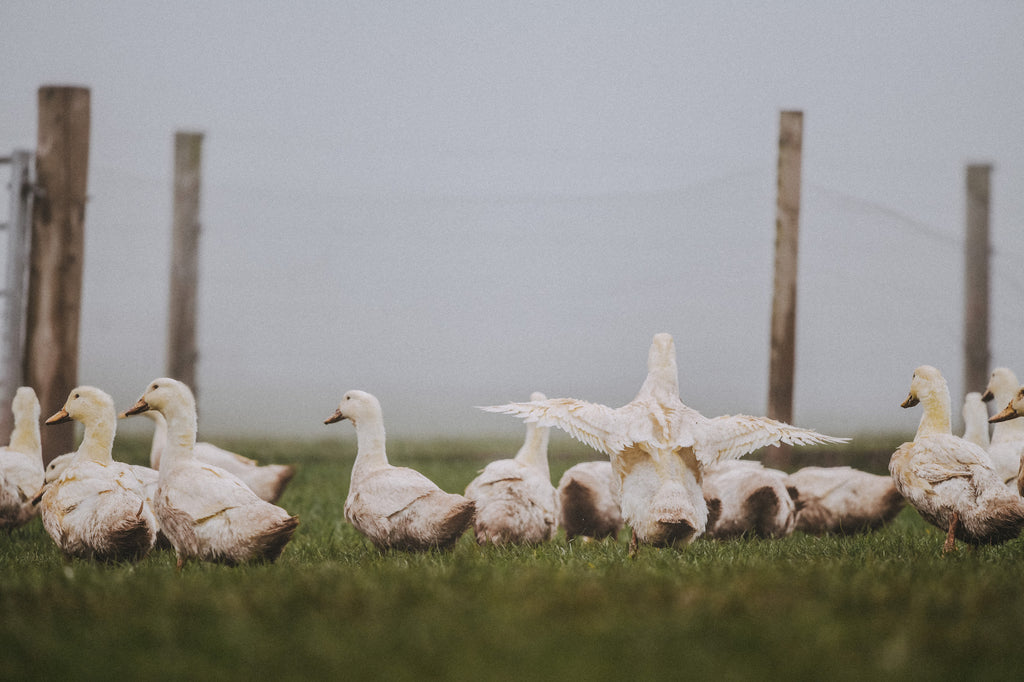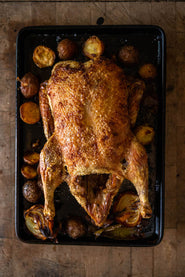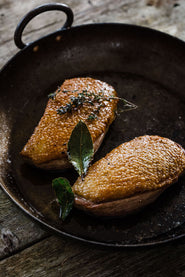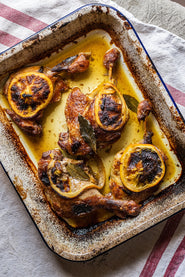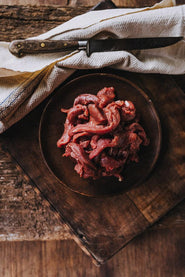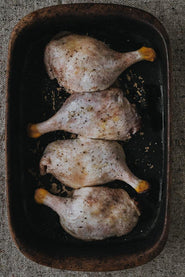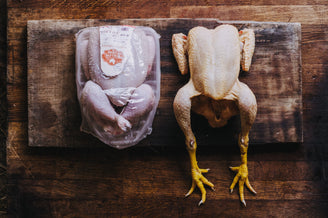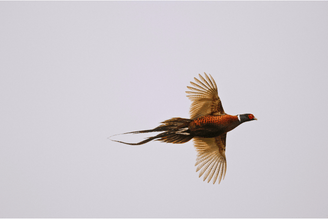Duck, once seen as a rare treat, perhaps a centrepiece for a smaller Christmas gathering, or often a fancy dinner party special, is now growing in popularity and is being consumed with reverence and greater frequency.
Duck has long been a favourite of mine, with its dense, rich meat and crucial layer of lovely fat. And what that fat delivers is deep flavour and a wonderful yielding texture, combined with the ultimate in delicious crisp skin. What more do you want from a bird?
You may imagine most of the duck’s we're eating in the UK to have lived lives of bucolic bliss, paddling, preening and scratching in the grass for delicious bugs. I’m afraid you’d be wrong. As the popularity of duck increases, so the birds' welfare is suffering. Millions of ducks are raised for meat in the UK, many in highly intensive units where the standard of welfare is shockingly low.
Factory Farmed Duck
Nearly all duck products on our supermarket shelves have been reared in systems that prevent ducks from behaving naturally. The majority of commercially farmed ducks in the UK spend their lives indoors in large barns. While some may have access to outside space they very rarely leave the barn and instead spend their days huddled inside, crowded amongst their flock.
They certainly don’t have access to water which is vitally important for the welfare of a duck. This is mainly because in large commercial farms, the producers want to keep the barn as clean and dry as possible. Adding the provision of bathing water adds cost and complexity, so it’s simply easier not to bother.
As active animals, ducks are designed to live near water. One of their strongest natural behaviours is to preen themselves by flicking water up and over their bodies then arranging their feathers appropriately. They love to be outside in rain and mud, splashing in puddles and sliding their bellies along the ground while the heavens open, that is about as good as it gets for a duck.
As omnivores ducks will eat a wide variety of pasture including some of the rougher grasses that other fowl won’t touch, as well as any bugs and grubs they can snag from the soil. Grains are important in a ducks diet. You may have seen a wild mallard greedily feed from a corn or barley field and then flop into a nearby lake or canal, sated for the afternoon.
Understanding how a duck behaves in the wild makes it even harder to digest how these creatures have become the latest fodder for factory farming, and with consumer demand on the up it is more important than ever to know how your bird has been reared.
Pipers Farm Properly Free Range Duck
We rear our own strain of Aylesbury duck, a large duck with pure white plumage, a pink bill, orange legs and feet.
The precise origins of the breed are unclear, but raising white ducks became popular in Aylesbury, Buckinghamshire, England, in the 18th century owing to the demand for white feathers as a filler for quilts. The Aylesbury breed was almost wiped out as the demand for duck feathers declined and industrial breeds better suited to leaner, faster growth desired by supermarkets, increased.
Our ducklings are brooded on the farm. They are kept inside in a warm barn for around three weeks to give the young birds chance to feather up, ready for a life of free ranging outdoors.
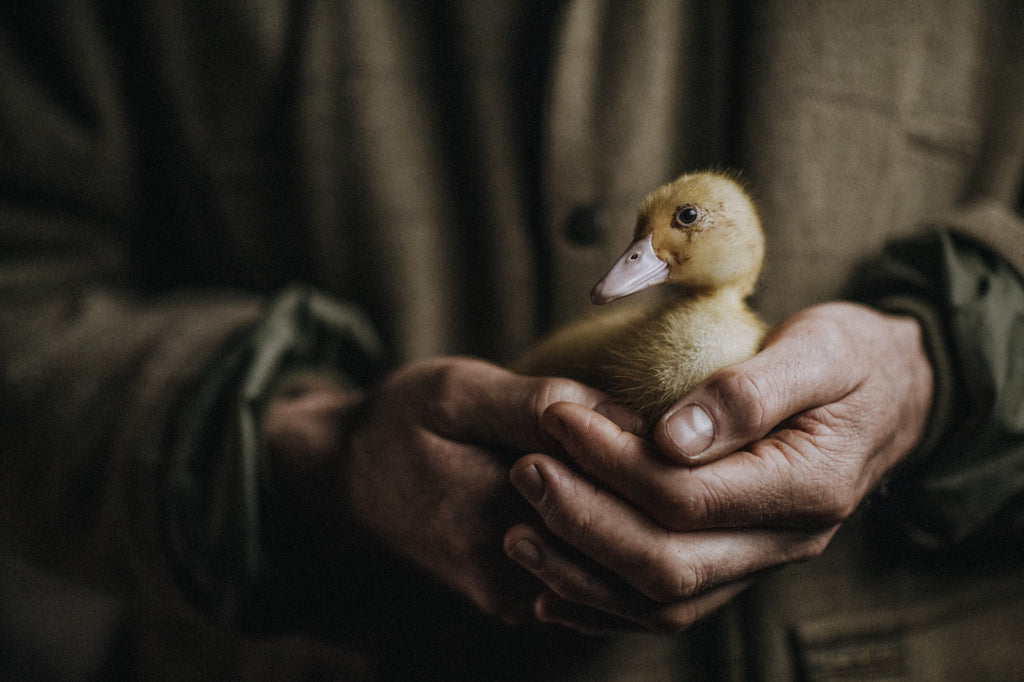
Once the birds have feathered up they are moved just a few meters to a large roomy barn, filled with a deep bed of straw which is changed daily.
During the day the side of the barn is completely open allowing the birds total access to the pasture. The ducks are shut in at night to protect them from any roaming predators.
Our ducks are completely free to roam outside on healthy hillside pastures amongst natural light. They have long grass in which to forage and take shelter, and a proper amount of space to run freely and flap their wings.
Each paddock has a meandering stream with moving water where the birds can paddle, splash and preen. We do not raise our ducks on a pond as it is important to create the healthiest environment possible. Ducks are incredibly messy and they will create a droppings, which is not a good combination in stagnant water.
The fresh water runs freely through the pasture, giving the ducks natural access to water, while ensuring their environment stays as healthy as possible. This develops contented birds with a strong natural immunity.
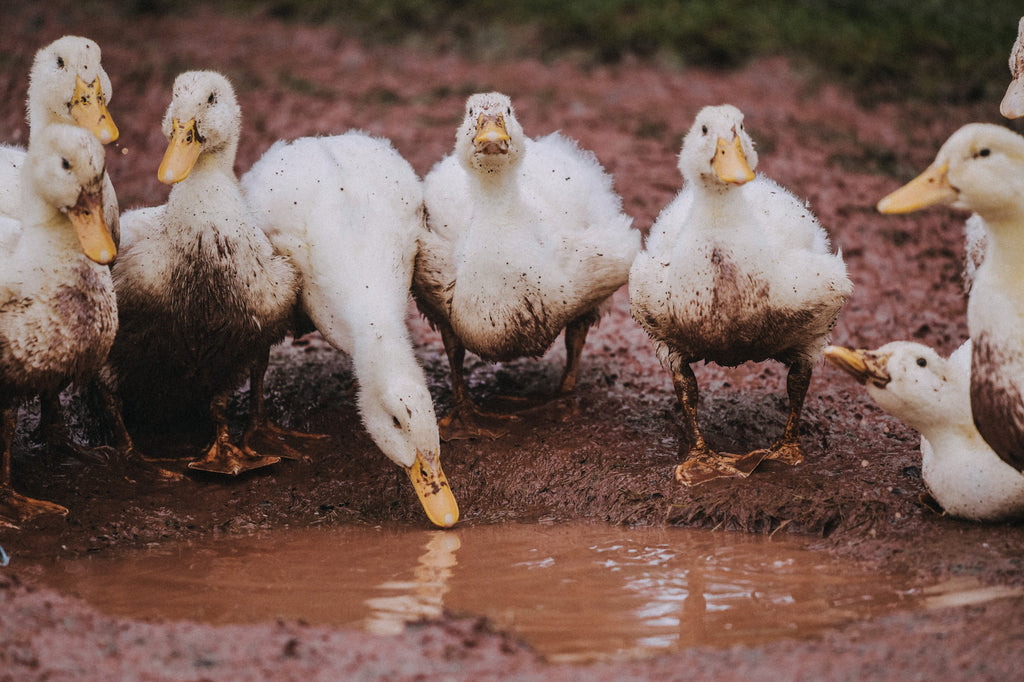
Our ducks are the ‘fastest’ animal we rear, at 8-9 weeks they have reached maturity. Rearing the birds for longer would result in very large birds with more fat than meat. It would also mean that feathers would be harder to remove, leaving damage to the bird itself.
Once our ducks have reached maturity, they are slaughtered on the same farm where they have been reared, this means they never have to travel anywhere. Each duck is waxed and dry plucked in the traditional manner.
Pipers Farm ducks are healthy, nutritious food, grown without the use of antibiotics, and safe from all the food poisoning bacteria associated with intensive farming and factory slaughterhouses. They are strong, healthy birds with a rich, sweet flavour, and strong bones for making nutritious stocks, soups and broths.
Our Properly Free Range ducks are available all year round and larger ducks are available at Christmas. As well as whole duck you can also shop free range duck cuts; duck breasts, duck legs and duck stir fry.
